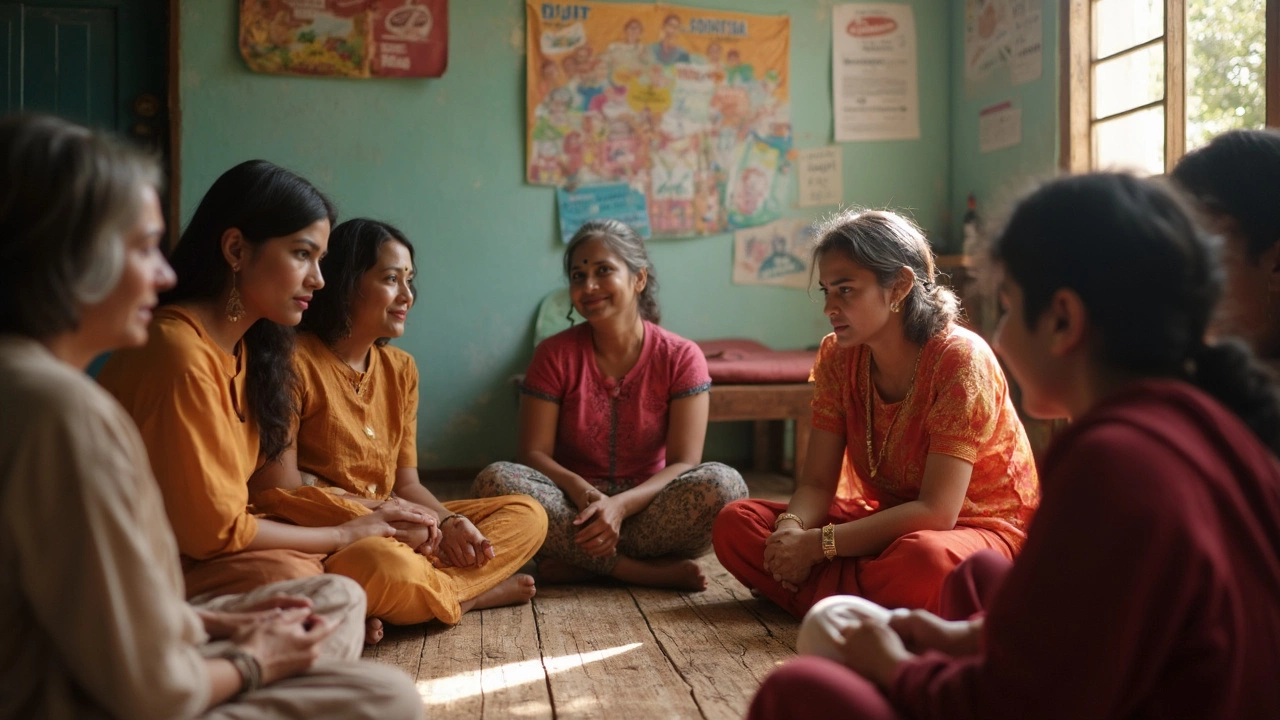Ever feel like you’re dealing with everything on your own? Turns out, finding people who actually listen and understand can make a huge difference. Support networks aren’t just for big crises—they work for everyday struggles, too. People who have someone in their corner recover from tough times faster, according to studies published by the American Psychological Association. So, how do you find your people?
The fastest way is to look locally. Hospitals, libraries, community centers, and even neighborhood apps often list support group meetings. Many groups focus on specific needs—like addiction, grief, parenting, or chronic illness. Don’t worry if you’re not sure where you fit in. Most groups are used to having new faces and actually love seeing fresh people show up.
If you’re not sure which group is right for you, don’t overthink it. Try visiting more than one. Most places aren’t picky about attendance—they get that you’re figuring things out. Showing up is already a big step, and you can always decide after a meeting if it feels right. Want some backup? Bring a friend the first time or ask the organizer what to expect. They’re usually happy to help with nerves.
- Why a Support Network Matters
- Where to Start Looking Locally
- How to Choose the Right Group for You
- Tips for Making Meaningful Connections
Why a Support Network Matters
It’s easy to brush off the idea of joining a support network, but honestly, life gets way tougher when you’re going solo. Connecting with others in local support groups makes handling stress, loss, or any big life change a whole lot easier. Research even shows that people who are part of a strong support network are less likely to feel isolated, and they tend to bounce back faster from setbacks.
Here’s something eye-opening: According to a 2021 Pew Research study, adults with a steady circle of support report being 44% more satisfied with their lives. The same study highlights that regular group connections lower the risk of depression and anxiety. That’s not just a nice bonus—sometimes, it’s a lifesaver.
| Benefit | Percentage Improvement |
|---|---|
| Life Satisfaction | +44% |
| Lower Depression Risk | –32% |
| Faster Recovery from Crisis | +25% |
Support groups get rid of that “nobody gets it” feeling. You meet folks who’ve been in your shoes—maybe it’s managing chronic illness, grieving a loved one, or trying to stay sober. Everyone needs a safe place to talk or even just listen. No lectures. No pressure. Just honest chats and real people, face to face or even virtually.
It’s not just about getting help either. Giving support to others boosts your own mood, gives you a sense of purpose, and helps you see things from a new angle. If you’ve never tried a support group before, you might be surprised at how normal (and actually helpful) it can feel.
Where to Start Looking Locally
If you’ve never hunted for a support group before, the good news is you’re surrounded by options. Your first stop? The local library. These places aren’t just for books anymore. Tons of libraries have free bulletin boards with flyers and announcements about all sorts of local support groups. If they don’t have something listed, the staff usually know who to ask in town.
Another solid option: community centers. Most towns and even small neighborhoods have a community or recreation center, and they often host support group meetings for everything from parenting to anxiety. Just ask at the front desk or check their website’s calendar of events.
Healthcare providers are another smart resource. If you’re dealing with anything medical—mental health, chronic illness, recovery, grief—ask your doctor or therapist if they know about local groups. According to the Mental Health America nonprofit, most clinics and hospitals keep updated lists of active support groups in your area.
- Check local hospitals’ “resources” pages online
- Search Facebook for keyword-specific community groups (like “Grief Support Dallas” or “Addiction Help Baltimore”)
- Visit Meetup.com and filter by topics and distance
- Call 211 from any phone to talk to someone who knows about area resources (it works almost everywhere in the US!)
Don’t ignore religious organizations if you’re open to them. Many churches, synagogues, and mosques host support groups that welcome anyone—no membership needed. They’re especially popular for addiction recovery, grief, and caring for sick loved ones.
Here’s a tip: When searching online, focus on using the support network keyword and add your city or neighborhood. This narrows your results to options within a short drive or even walking distance.

How to Choose the Right Group for You
Trying to figure out which support group is going to help you the most? It’s not as complicated as it sounds. It mostly comes down to what feels comfortable, what matches your needs, and what kind of vibe you get from the group. Let’s break it down step by step, so you don’t have to go in totally blind.
- Support network focus: Start by checking what the group actually covers. Some focus on mental health, others on parenting, substance recovery, health issues, or just general emotional support. Not all groups are created equal, and it’s fine to look for one that’s specific to your situation.
- Group size: Studies show that groups with 5-15 people are the sweet spot. You get the chance to talk, but it’s not so crowded you’re lost in the shuffle.
- Format and setting: Some people prefer in-person meetings. Others are only comfortable online or on the phone, especially when trying things out. Most groups now offer both options since COVID-19 changed the landscape.
- How open you want to be: Every group has its own feel. Some are more formal and stick to a plan, while others are more casual. It’s okay to try a few until you find one where you feel okay speaking up (or listening quietly).
- Cost and location: Free groups are everywhere, but don’t assume you have to pay. Hospitals and community centers usually offer no-cost meetings. Look for a place that’s easy for you to get to—reducing hassle makes it more likely you’ll actually keep going.
Check out the table below for a quick look at how things can differ between groups:
| Type of Group | Average Size | Common Meeting Place | Cost | Online Option |
|---|---|---|---|---|
| Grief Support | 8-12 | Hospitals, Churches | Usually Free | Often Yes |
| Addiction Recovery (like AA) | 10-20 | Community Centers | Always Free | Yes |
| Parent Support | 6-15 | Libraries, Schools | Varies | Sometimes |
| Chronic Illness | 5-10 | Clinics, Online | Usually Free | Yes |
Don’t forget, you’re allowed to try out a meeting without any commitment. If something feels off, you can always leave. You deserve a group that helps you feel heard and supported, plain and simple.
Tips for Making Meaningful Connections
Finding a support network is one thing, but actually making friends—even in a group with similar experiences—sometimes feels tricky. The good news? Most people are a little nervous at first, but simple actions help break the ice.
Start by bringing something small to share, like snacks or printed info you found helpful. Not only does this get conversations going, but researchers from the University of California say people instantly feel closer when sharing something, even as basic as coffee at a table.
- Be open about why you’re there. Even just saying, “It’s my first time and I’m not sure what to expect,” invites real conversation.
- Listen actively—nod, make eye contact, and follow up on what someone says. Lots of people think they need to talk more, but actually, people trust great listeners.
- Jot down the names of folks you meet. A quick note in your phone makes following up way easier and shows you care if you use their name next time.
- Don't be afraid to reach out between meetings. A quick message or call (if they’re comfortable with it) can deepen the bond and turn group support into a genuine friendship.
It's normal if you don’t click with everyone. After all, you’re not shopping for best friends, just looking for people who understand and care. Consistency matters: research shows that attending three or more meetings increases your comfort and connection with the group. Stick with it! Over time, these relationships usually get stronger, and you’ll build a true sense of community.
